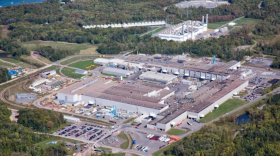Scientists at the University at Albany are developing a state-wide weather detection system called the mesonet. The network of 125 weather stations will record weather variables like temperature, wind speed, and precipitation. A study by the American Meteorological Society shows New York’s economy suffers the most from inclement weather and environmental variability. Concluding this series, we speak with a farmer whose livelihood depends on the weather.
One hope is that this network will help business cut their losses. Since tourism and agriculture drive much of the state’s economy, New York is particularly sensitive to adverse weather.
Christian Yunker is a farmer in Genesee County. His farm raises dairy cattle and grows cash crops. He has a small personal weather station perched on the corner of his roof. Yunker and his team check the personal station, as well as several different weather outlets like the NOAA and Weatherbug first thing in the morning. He says it informs his farming decisions:
"Whether we're mowing hay and there's still dew on the ground or when's the wind gonna pick up? Should we be spraying this morning and not this afternoon ‘cause wind speeds are going to increase..."
Yunker says his weather station doesn't offer him as much data as he'd like to have. He like to know the soil temperature, for example.
"That would help us plan our day tremendously, if we had more accurate and more detailed information, for sure. Cause every day starts with the weather," Yunker says.
To date, UAlbany has been promised almost $24 million to build the mesonet. This money comes entirely from FEMA, thanks mostly to hazard mitigation grant projects after Superstorm Sandy.
Proponents of the mesonet hope that this investment will help businesses like Yunker’s farm recover money lost to adverse weather.







